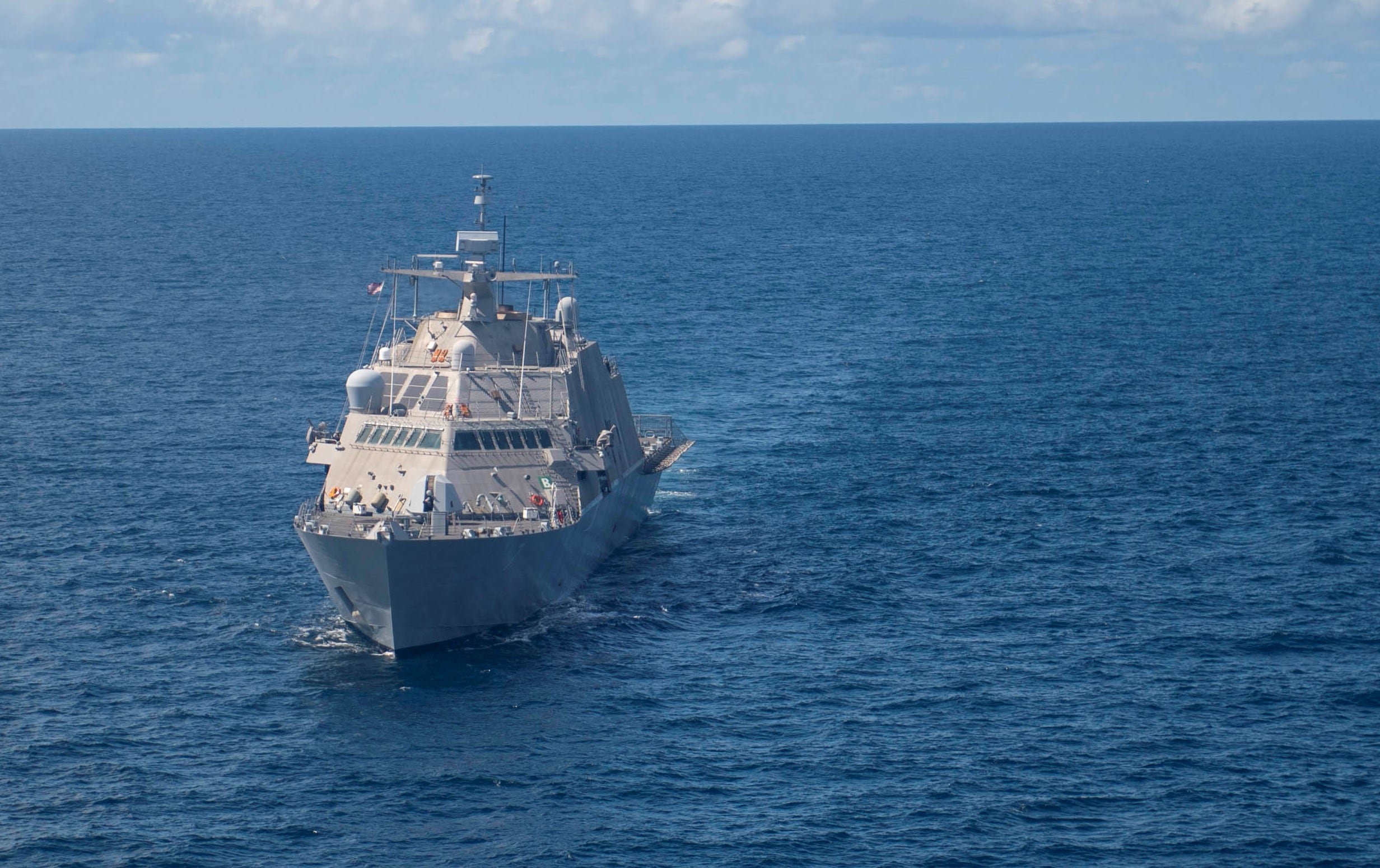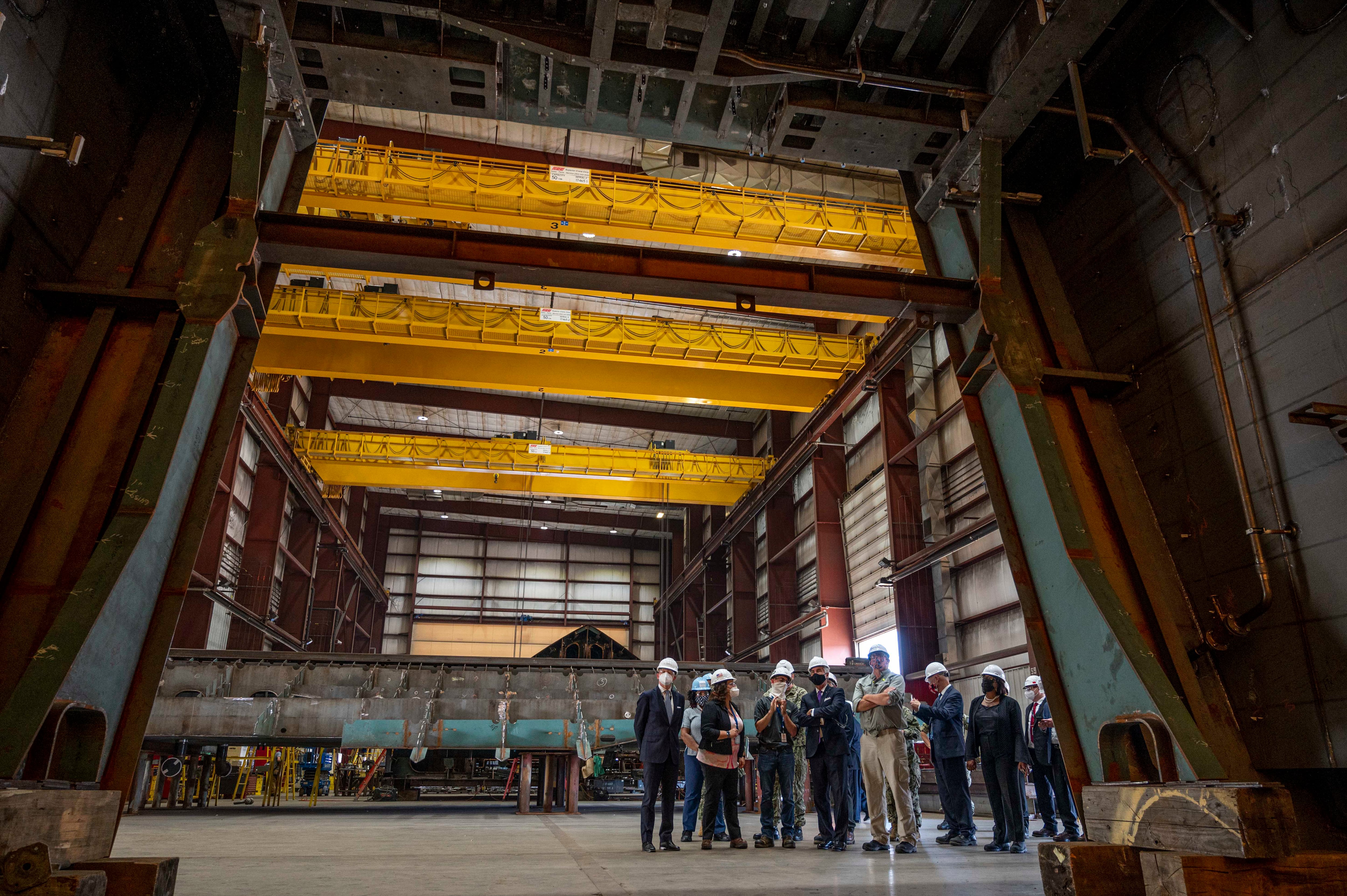WASHINGTON – The U.S. Navy will bear some portion of the cost to replace faulty combining gears on the Freedom-variant littoral combat ships – the exact amount is being negotiated with Freedom LCS builder Lockheed Martin – in an unexpected bill that contributed to the Navy asking to decommission two hulls it commissioned less than five years ago.
Conversations between the Navy and Lockheed Martin are ongoing, even as the new combining gear solution has been tested ashore, has been installed on LCS-21 and will begin testing at sea in late September, Howard Berkof, the deputy program manager for LCSs at the Program Executive Office for Unmanned and Small Combatants, said Aug. 2 at the Navy League’s annual Sea Air Space symposium.
Even if those negotiations break in the Navy’s favor, though, the service will still end up paying part of the bill, Berkof told Defense News.
Berkof said the Navy claimed the combining gear design flaw constituted a “latent defect” in the ships.
“There’s actually a latent defect contract clause, and if that is invoked, then you open up the contracts and you go back on the construction share line, so it would be shared costs between the Navy and Lockheed Martin,” he explained. “So we have publicly said we believe this is a latent defect, but we are in discussions with Lockheed Martin about, here’s what the contract says, here’s what we believe is the situation, and we’re talking with them about how we come through that.”
So even in the best case, the Navy would bear some of the cost, in accordance with the share line that defines how the Navy and prime contractor share responsibility for cost-overruns or share profits when costs are reduced.
Berkof said the Navy has developed an internal cost estimate per ship hull for the combining gear replacement effort – an estimate that he couldn’t share, given the ongoing negotiations with Lockheed Martin and ongoing budget discussions as part of fiscal 2023 planning efforts– and that cost estimate led the Navy to determine it wanted to decommission LCSs 7 and 9, the Detroit and the Little Rock, rather than pay to replace their combining gears.
An industry source, who spoke to Defense News on condition of not being named, said the cost to fix up Detroit and Little Rock would be greater than for the other ships, since those two had experienced combining gear breakdowns that led to wider damage on the ship that would have to be addressed.
The combining gear flaw
Berkof said the Freedom-variant LCSs were designed with a complex combining gear system that relies on ball bearings as it combines the ship’s gas turbines and diesel engines to power the propulsion system. The system works fine when just one fuel source powers the ship, but when both the diesel engine and the gas turbine are being combined for maximum power and speed, there’s too much load on the clutch, he explained to Defense News.
This issue does not affect the Independence-variant LCSs, which are built by Austal USA and have a different hull and propulsion system.
Berkof said the Freedom LCSs already delivered to the fleet can continue operating but under a class-wide advisory that restricts them from going at top speeds that would kick the propulsion system into that combined gas turbine and diesel engine mode.
German manufacturer RENK, who designed the combining gear system, has developed a fix that swaps out the ball bearings for journal bearings, which can better handle the pressures of the combined diesel and gas mode, Berkof said. Land-based tests proved the new system successful, and RENK has completed installing the fix on LCS-21, the Minneapolis-Saint Paul. Berkof said during a presentation at Sea Air Space that the ship was being put back together again, after installing the new bearings into a tight space required removing other systems. The ship should begin at-sea testing by late September.
Commander of Naval Surface Forces Vice Adm. Roy Kitchener told reporters at the Pentagon in July that he hadn’t put a timeline on the at-sea testing effort, saying that he wanted to be convinced that RENK’s proposal is the right solution.
“I told them that I want it to be very rigorous. … We need to do due course there, so I haven’t really put a timeline on it, although I told them we need to do it with some kind of urgency. But I do think it needs to be a rigorous test, not just something where we can say we went out and operated for this many hours; I need a little bit more, to see some good results before I’m ready to tell the fleet commanders, hey, we think we’re out of the woods on this one,” he said.
Berkof agreed, saying that his program office, the fleet and the Navy’s chief engineer are working closely, “making sure that we have enough robust testing – the point is, we don’t want anybody to come back and say we should have done more testing, that is the number-one priority.”

Backfitting the fix
The Navy stopped accepting delivery of Freedom LCSs in January, leading to a backup of ships at the Marinette Marine shipyard in Wisconsin that builds them for Lockheed Martin.
Berkof told Defense News that LCSs 21 and 23 will have the biggest schedule impact, since they were near delivery and had to be halted. Each subsequent hull will see a lesser schedule delay – and starting with LCS-31, the new combining gear system will be installed during construction from the outset without any need to rip out the old system.
The ships at Marinette will be outfitted with the new system there or just up the lake in Escanaba, Mich.
For the LCSs already delivered to the fleet, Berkof told Defense News that the ships would get the fix during their next scheduled selected restricted availability (SRA) maintenance period.
The Southeast Regional Maintenance Center in Florida would work with private shipyards to oversee this work near Mayport, Fla., where these Freedom LCSs are homeported.
Berkof said RENK technicians will need to do the combining gear installation itself at both Marinette Marine and at the Florida repair yards, so the timing of the backfits will have to be coordinated so that the subcontractor can perform the work in both locations.
Despite the delays in delivering the ships to the Navy, Berkof said the program office is working hard to not affect these LCSs’ maiden deployment schedules.
Typically, the ships would deliver to the Navy, sail through the Great Lakes and down to Mayport, and then go through a post-shakedown availability at a maintenance yard that could span several months. Now, much of the work that would be done during PSA is actually being pulled ahead and done now in Marinette, as the ships sit idle until they can be outfitted with the new combining gear system. Berkof said that work includes things like habitability modifications, water jet modifications, pump system work and more.
Doing the work now in Wisconsin “helps us buy back critical time” and helps the ships become available to U.S. 4th Fleet or other potential fleet commanders who would use these ships.
Berkof said a contract is in place for pulling this work ahead at Marinette and is taking place now.
He said it should be relatively straightforward to get the combining gear modifications done on the ships that haven’t yet delivered. One ship, LCS-19, the St. Louis, is within a year of its delivery to the Navy and falls within a warranty period, and Berkof said it’s more unclear what the process will look like for getting the fix made on that ship and determining who pays the bill.
For odd-numbered LCSs 5 through 17, he maintains the latent defect clause should apply, but he said discussions with Lockheed Martin need to wrap up in a timely manner to get a contract in place to do the backfits at a private repair yard in the Mayport region.
Asked about that timeline for negotiations, he said the Navy and Lockheed could continue talking while the at-sea testing continues this fall, but there is some urgency to begin the backfits when the solution is fully tested and approved for installation.
“We don’t have a lot of time, but we have enough time to get this done correctly,” he said.

Decommissioning two while sister ships are built
Berkof said during his presentation that the LCS program continues to christen, launch and commission ships, even as the COVID-19 pandemic has limited its ability to celebrate these milestones.
Since the pandemic began last spring, he said, Lockheed Martin and Austal have begun fabrication on LCSs 31, 34 and 36; laid the keels of LCSs 29, 30, 31, 32 and 34; launched LCSs 25, 28 and 30; and completed builder’s trials and acceptance trials on 21, 23, 24, 26 and 28.
Even as their sister ships come to life and join the fleet, LCSs Detroit and Little Rock are awaiting congressional action to save them – after less than five years and less than four years in the fleet, respectively.
In May, the Navy announced as part of its FY22 budget request that it wanted to decommission the pair.
The Navy already won approval to decommission LCSs 1 and 2, which were being used at test platforms rather than deployable ships. The Navy asked in the FY22 proposal to decommission LCSs 3 and 4, the two other test assets, as well as 7 and 9 – two of the three oldest Freedom-variant LCSs available to the fleet, but skipping over the six-year-old LCS-5, the Milwaukee.
A senior defense official on May 27 said Milwaukee is currently testing the anti-submarine warfare mission package and will be the first to deploy with it – and since the ship is far enough along conducting that anti-submarine work, the Navy wanted to preserve the ship and its crew. As for the rest of the Lockheed ships, the official said: “We looked at the odd-numbered hulls that have had some issues with them — you all probably know and have written about the combining gear issues that we’ve had on some of those odd-numbered LCSs. As we work through those, again, you’re at this trade-off” between “retaining incredible capability” that LCSs can provide the fleet and getting rid of ships that are costing the Navy more than it can afford in a tight budget environment.
The Navy ultimately decided it didn’t want to spend the money to get LCSs 7 and 9 back in fighting condition and would rather decommission them – though so far the House Appropriations defense subcommittee has pushed forward a bill that would protect the pair.
Megan Eckstein is the naval warfare reporter at Defense News. She has covered military news since 2009, with a focus on U.S. Navy and Marine Corps operations, acquisition programs and budgets. She has reported from four geographic fleets and is happiest when she’s filing stories from a ship. Megan is a University of Maryland alumna.





